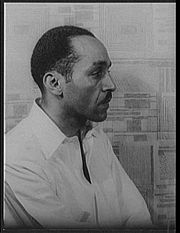
Willard Motley
Encyclopedia

Archibald Motley
Archibald John Motley, Junior was an African-American painter. He studied painting at the School of the Art Institute of Chicago during the 1910s, graduating in 1918...
. The two were raised as brothers, although in actuality Archibald was Willard's uncle. Born into an affluent family in either 1909 or 1912 (sources vary), Willard Motley grew up in Chicago's Englewood neighborhood, in one of the only African-American families residing there.
The Chicago Defender
Chicago Defender
The Chicago Defender is a Chicago based newspaper founded in 1905 by an African American for primarily African American readers.In just three years from 1919–1922 the Defender also attracted the writing talents of Langston Hughes and Gwendolyn Brooks....
published some of Motley's fiction when he was only 13 years old, launching him on his career as a writer. He was soon writing a weekly column for young readers called "Bud Says" under the pseudonym "Bud Billikin" (Chicago still holds an annual Bud Billiken Parade and Picnic).
After graduating from high school Motley traveled to New York, California and the western states, earning a living through various menial jobs, as well as by writing for the radio and newspapers. Returning to Chicago in 1939, he lived near the Maxwell Street
Maxwell Street
Maxwell Street is an east-west street in Chicago, Illinois that intersects with Halsted Street just south of Roosevelt Road. It runs at 1330 South in the numbering system running from 500 West to 1126 West. The Maxwell Street neighborhood is considered part of the Near West Side and is one of the...
Market, which was to figure prominently in his later writing. He became associated with Hull House
Hull House
Hull House is a settlement house in the United States that was co-founded in 1889 by Jane Addams and Ellen Gates Starr. Located in the Near West Side of , Hull House opened its doors to the recently arrived European immigrants. By 1911, Hull House had grown to 13 buildings. In 1912 the Hull...
, and helped found the Hull House Magazine, in which some of his fiction appeared. In 1940 he wrote for the Works Progress Administration
Works Progress Administration
The Works Progress Administration was the largest and most ambitious New Deal agency, employing millions of unskilled workers to carry out public works projects, including the construction of public buildings and roads, and operated large arts, drama, media, and literacy projects...
Federal Writers Project along with Richard Wright
Richard Wright (author)
Richard Nathaniel Wright was an African-American author of sometimes controversial novels, short stories, poems, and non-fiction. Much of his literature concerns racial themes, especially those involving the plight of African-Americans during the late 19th to mid 20th centuries...
and Nelson Algren
Nelson Algren
Nelson Algren was an American writer.-Early life:Algren was born Nelson Ahlgren Abraham in Detroit, Michigan, the son of Goldie and Gerson Abraham. At the age of three he moved with his parents to Chicago, Illinois where they lived in a working-class, immigrant neighborhood on the South Side...
.
In 1947 his first novel, Knock on Any Door
Knock on Any Door
Knock on Any Door is an American court-room trial film noir directed by Nicholas Ray and starring Humphrey Bogart. The picture introduced John Derek to film and was based on the novel of the same name by Willard Motley.-Plot:...
appeared to critical acclaim. A work of gritty naturalism
Naturalism (literature)
Naturalism was a literary movement taking place from the 1880s to 1940s that used detailed realism to suggest that social conditions, heredity, and environment had inescapable force in shaping human character...
, it concerns the life of Nick Romano, an Italian American altar boy who turns to crime because of poverty and the difficulties of the immigrant experience. It was an immediate hit, selling 47,000 copies during its first three weeks in print. In 1949 it became a movie starring Humphrey Bogart
Humphrey Bogart
Humphrey DeForest Bogart was an American actor. He is widely regarded as a cultural icon.The American Film Institute ranked Bogart as the greatest male star in the history of American cinema....
. In response to critics who charged Motley with avoiding issues of race by writing about white characters, Motley said "My race is the human race."
His second novel, We Fished All Night was not hailed as a success, and after it appeared Motley moved to Mexico to start over. His third novel, Let No Man Write My Epitaph picks up the story of Knock on Any Door. Columbia Pictures made it into a movie in 1960. Ella Fitzgerald
Ella Fitzgerald
Ella Jane Fitzgerald , also known as the "First Lady of Song" and "Lady Ella," was an American jazz and song vocalist...
's music for the film was released on the album Ella Fitzgerald Sings Songs from "Let No Man Write My Epitaph".
The bulk of Motley's archive is held in Rare Books and Special Collections at Northern Illinois University
Northern Illinois University
Northern Illinois University is a state university and research institution located in DeKalb, Illinois, with satellite centers in Hoffman Estates, Naperville, Rockford, and Oregon. It was originally founded as Northern Illinois State Normal School on May 22, 1895 by Illinois Governor John P...
.
On March 4, 1965, Motley died in Mexico City. One final novel, Let Noon Be Fair was published the following year.
Novels
- Knock on Any DoorKnock on Any DoorKnock on Any Door is an American court-room trial film noir directed by Nicholas Ray and starring Humphrey Bogart. The picture introduced John Derek to film and was based on the novel of the same name by Willard Motley.-Plot:...
(1947) - We Fished All Night
- Let No Man Write My Epitaph
- Let Noon Be Fair (1966) - published posthumously

